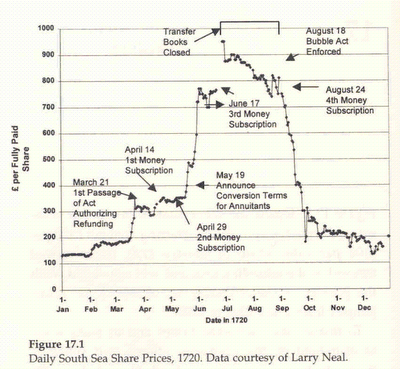One of the earliest financial bubble (economic bubble).
"A famous Scottish guy sleeping here,
he's a calculation genius, but he tempts France economy failure with simple
Algebra rules", from the epitaph of John Law.
Sometimes
economists and financial experts argue that which one is the earliest economic
bubble? Basically, is Dutch Tulip mania? John law's Mississippi company 80 years later? Or British South Sea
company?
 A
“bubble” in the world of finance is defined as an unusually increase rapidly in
stock prices or the value of some other assets, the increase is then followed
by an equally quick collapse in share prices or other asset prices.
A
“bubble” in the world of finance is defined as an unusually increase rapidly in
stock prices or the value of some other assets, the increase is then followed
by an equally quick collapse in share prices or other asset prices.
No
matter what is the earliest financial bubble, these three events are the most typical
national financial crisis in European civilization. As far as I concerned, I am
not going to care the Dutch flower because its only to be called a mania, I am
not going to talk about the wizardly monetary theory of John law as well, although
its pretty famous but it was popped a bit later than South sea bubble. So, I
believe the title of the first economic bubble should belong to South sea
company.
Even
if so, I have to start in John Law's intriguing story in order to recall the
shocked all over the world that financial fraud event - South Sea
bubble.
In
the early 18th century, when the economy of France
was really depressed and the government got worse debt trouble and taxes were highly,
John Law came up and pulled France
government back in the deeply financial crisis. In 1716 John Law convinced the
French government to let him open a bank that could issue bank notes. The paper
notes, as a medium of exchange, would be replaced gold and silver and would
circulate. John believed that banknotes could increase the money in circulation,
which would increase commerce. There is no doubt, These series actions have
saved the finances of the French government at that time.
At the same period, a country which suffered same financial situations
with France and it has £7
million loan to finance the war against France in 1720. Here it is, England, a such noising neighbor of France.
In fact, the South Sea Company has established in 1711, but when the House of
Lords passed the South Sea Bill, which allowed the South Sea Company has a monopoly
in trade with South America in 1720. Then, an amazing plot begins....






